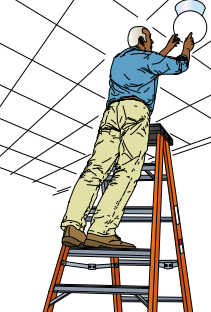
From WorkSafeBC’s Ladder Safety for Manufacturing
“This will haunt me for the rest of my life; don’t let it happen to you.”
That’s what safety consultant Robert Green says about the injury that changed his life in 2007.
In his post Don’t Risk the Fall, published in Canadian Occupational Safety Magazine, he described how he was injured while working as the maintenance lead for a large company in southern Ontario. He was a former fire chief at an industrial plant and taught safety and rescue to fire brigades and emergency response teams, with 30 years of maintenance, engineering, and health and safety experience.
Yet despite this much safety background, Robert made a momentary decision that led to a tragic consequence. He set up a “brand new” step ladder on ground level, climbed it, and removed a ceiling tile from overhead with his left hand. He was on the third step, maintaining three-point contact, when the ladder shifted and fell suddenly, due to a structural deficiency in its back beam.
He landed on his shoulder, tearing three of four tendons from the shoulder joint. Doctors performed a four-hour surgery with “no guarantees” and today he has regained some mobility. Despite this improvement, that includes two years of physiotherapy, Robert’s injury is life-changing. It takes a lot of strength to keep going after such a massive set-back, and I truly admire his efforts – in reinventing his career after an injury and taking his message to the community. He used RRSP funds to launch his company Progressive Workplace Safety and continues talking with groups about ladder safety.
“I show them my injury and the inability to operate my right shoulder and right arm properly,” Robert says via email. “This usually convinces them to remove and destroy the damaged or poor condition ladder at home and enhance the need to inspect all ladders in the workplace.”
His words on how to keep going during hard times will stay with me – so I thank him for this.
“You can’t give up. Keep moving forward and toward your goals even if you have to redirect your priorities and refocus your ever-changing goals,” he says. “Your family is the most important asset in your life; look to them for support when things get tough. They are the only ones who will not let you down when things around you come crashing down.”
And of course “families” don’t just mean our blood relations, in my view. We can turn to our communities and the people around us – even on this blog – and share support.
For more info on ladder safety, see WorkSafeBC’s Ladder Safety in Manufacturing video, as well as the interactive ebook, available from the iTunes bookstore.


